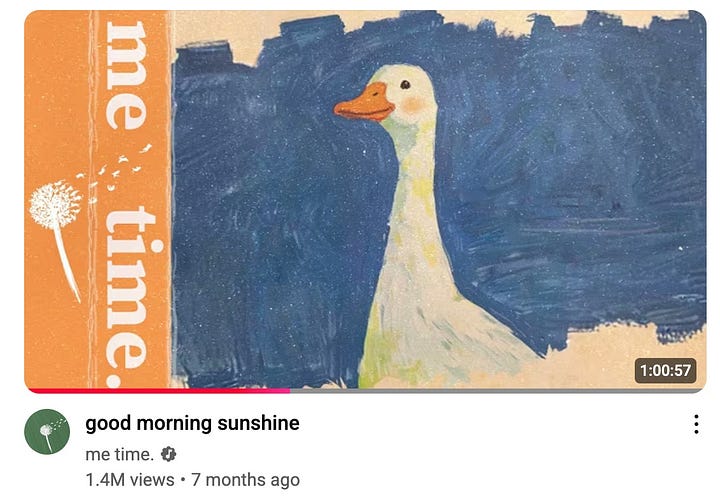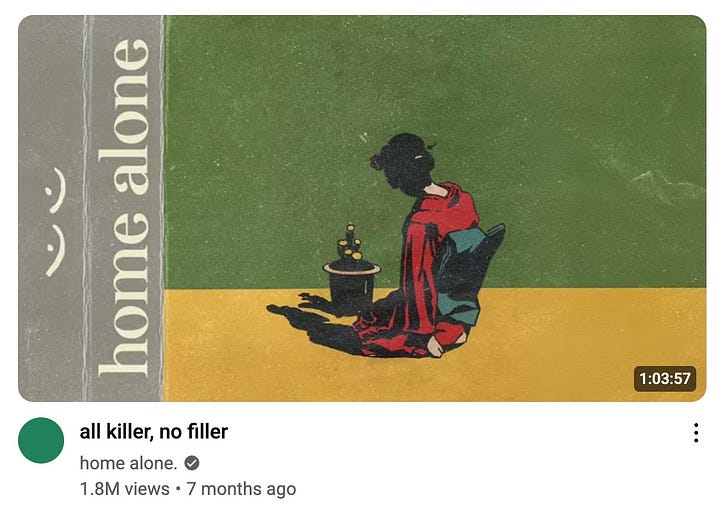the slop in my morning coffee
oh no i am part of the problem too
I’m proud of my morning routine. I used to be someone who slept in until the last possible moment—rushing out of bed, throwing on clothes, barely making myself presentable, and booting up my laptop just in time for my first meeting.
But over the last few months, that’s changed. I wake up at the same time every day—8 a.m. Instead of racing to my desk, I mosey over to my kitchen and begin my ritual. I set my electric gooseneck kettle to 205°F, weigh out 15 grams of locally roasted single-origin coffee, prep my pour-over station with a fresh filter, and load up a YouTube playlist with some title consisting of "chill," "relaxing," "lofi," and "soul" while I turn my attention to the dishes.
Music has always played a big role in my life. As a teenager, I escaped the confines of the semi-rural suburbs of western North Carolina by diving into online music forums. I combed through "share threads" on 4chan’s /mu (a surprisingly tame corner of the infamous message board), managed my seed ratio on What.CD, and scoured Google Blogspot for other indie heads writing about the latest obscure releases. Honestly, I attribute my data career to those early years of meticulously curating a massive music library—manually entering label info, release years, and other metadata with religious dedication.
These days, I'm busy. Monday through Friday, I spend 10 hours a day at my desk juggling urgent Slack messages and emails, sitting in meetings for up to 8 hours, and performing tiny miracles just to stay on top of my ever-growing to-do list. By the end of the day, I’m completely drained. I don’t have the energy to dig for new music. I don’t want to gamble on something I might not like. I just open Spotify, turn on the DJ, and let the algorithm comfort me with a familiar, easy blend of songs I already love.
During my morning coffee routine, I wash the dishes while the water heats up, and I listen to whatever YouTube playlist I’ve picked for the day. It seems like there’s always a new one—some video with a latte on the cover, or a cozy mug of tea, curated around a niche that feels like it was made just for me.




And in a way, it was.
I started noticing comment threads on these videos complaining about AI-generated music. That surprised me—because to my ears, these playlists didn’t sound AI-generated at all.
So I decided to dig a little deeper.
YouTube has started aggressively promoting AI-generated music on users’ home pages, pushing it front and center—replacing valuable real estate that used to be reserved for actual creators and artists. These playlists rack up millions of views, not because they’re good, but because they’re optimized: easy to crank out en masse, designed to game the algorithm, and built off the stolen labor and intellectual property of real, working musicians.
And it’s not just YouTube. I’ve started noticing it on Spotify too. The “chill lofi” playlists I’ve come to adore—the ones I put on while working, cleaning, or just trying to make it through my to-do list—are increasingly full of the same soulless, AI-generated slop. What used to be a source of discovery and comfort is now starting to feel like a hollow simulation of the thing I loved. There’s something really insidious about it: the automation of creativity, sold back to us as “vibes.”
These platforms know that most of us aren’t listening closely. We’re working. We’re commuting. We’re washing dishes or trying to focus.
Will Tavlin wrote about this phenomenon in Casual Viewing, reflecting on Netflix’s strategy. He argues that Netflix’s business model doesn’t depend on producing good TV or film—it just needs to produce something. Background noise. Something that’ll autoplay endlessly while you scroll your phone or tidy your living room. To quote Tavlin directly:
“Play Something,” as in: play anything. It doesn’t matter if it’s good or bad, if a user is on their phone or cleaning their room. What matters is that it’s on, and that it stays on until Netflix asks its perennial question, a prompt that appears when the platform thinks a user has fallen asleep: “Are you still watching?”
I’m not watching. Or in this case, I’m not listening.
And here’s the part I hate admitting: I’ve been part of the problem. I haven’t been paying attention. I’ve been ingesting slop. Letting the algorithm spoon-feed me sonic wallpaper. I, someone who once poured hours into organizing music libraries and lovingly labeling metadata by hand, have been hitting "play" on playlists that erase the very artists I grew up revering.
This isn’t just a personal failure—it’s structural. As the recent piece slop capitalism and dead internet theory outlines, platforms like Spotify, YouTube, and Instagram aren’t passively surfacing this content; they’re actively replacing human creativity with AI-generated filler to cut costs, increase profits, and condition us to expect less. Their goal isn't to elevate voices or cultivate culture—it’s to saturate every feed with empty spectacle and call it “content.” The more hollow the media, the more pliable the user.
When the goal is to produce more of more, human creativity becomes a liability. What we’re left with is a feed full of bots imitating culture—not adding to it.
So what do we do?
For me, it starts with returning to intention. Paying closer attention to what I consume—even in the background. Finding joy in curation again. Seeking out real people making real music. Asking a friend for a playlist. Buying a record and listening to it with intention, slowly.
Because even when I’m just washing dishes—I want to know that someone, somewhere, made the song I’m listening to. On purpose.


When I was in my teens and 20s I sought out any new music all the time, it was like a point of pride. Grad school and a demanding job really tamped that down, but the last few months I've really been enjoying the substack New Bands for Old Heads. It's not lofi beats, but it has given me a small window to the giant and overwhelming world of new music. And it's all curated by a real person.
I’ve known about what Spotify’s been doing with my lofi playlists for some time. But imagine my horror I heard a Notebook LM podcast in my feed. The undercutting of creators is so widespread and upsetting. But I really don’t appreciate how they’ve hacked our attention without thinking how to use these algorithms to better serve our society.